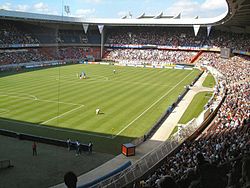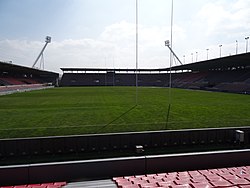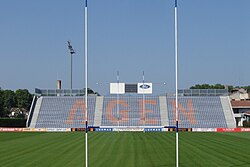| French: Coupe du monde de rugby 1991 | |
|---|---|
 | |
| Tournament details | |
| Host nations | |
| Dates | 3 October – 2 November (31 days) |
| No. of nations | 16 (33 qualifying) |
| Final positions | |
| Champions | |
| Runner-up | |
| Third place | |
| Tournament statistics | |
| Matches played | 32 |
| Attendance | 1,027,827 (32,120 per match) |
| Top scorer(s) | |
| Most tries | (6 tries each) |
← 1987 1995 → | |
The 1991 Rugby World Cup (French : Coupe du monde de rugby 1991) was the second edition of the Rugby World Cup, and was jointly hosted by England, Scotland, Wales, Ireland and France: at the time, the five European countries who participated in the Five Nations Championship. This was the first Rugby World Cup to be staged in the northern hemisphere, with England the hosts of the final. Also for the first time, qualifying competitions were introduced as the number of entrants had increased, from 16 nations four years earlier, to 33 countries. The eight quarter-finalists from 1987 qualified automatically with the remaining eight spots contested through qualifiers by 25 countries. This resulted in only one new side qualifying for the tournament, Western Samoa replacing Tonga. The same 16-team pool/knock-out format was used with just minor changes to the points system. South Africa was again not included because of sanctions imposed on the country by the International Rugby Board (IRB), due to the government's apartheid policies.
Contents
- Qualification
- Venues
- Squads
- Referees
- Format
- Pool stage
- Pool 1
- Pool 2
- Pool 3
- Pool 4
- Knockout stage
- Quarter-finals
- Semi-finals
- Third-place play-off
- Final
- Statistics
- Broadcasters
- References
- External links
The pool stages produced a major upset when Western Samoa, who were making their debut in the tournament, defeated the 1987 semi-finalists Wales 16–13 in Cardiff. Along with the other results in the group, this led to the elimination of Wales, who finished third in Pool 3. Also notable in pool play was that Canada finished second in their pool to qualify for the quarter-finals, which remains their best performance in the World Cup. Fiji, as quarter-finalists four years earlier, had expected to occupy that position, but after the upset loss to Canada and a hammering by France, they lost even their final match against the unfancied Romanian team. Earlier, the opening match had pitted the holders New Zealand against the hosts England: New Zealand overturned a narrow half-time deficit to win the match and the pool, both teams qualifying for the quarter-finals with easy victories in their other matches. Scotland beat Ireland to top their pool, again both teams qualifying.
In the quarter-finals, neither Canada nor Western Samoa proved a match for New Zealand or Scotland, respectively. [1] Meanwhile, England knocked out 1987 finalist France in a bruising encounter. [2] Australia pipped Ireland 19–18 in a thrilling match at Lansdowne Road, with a last-gasp try from fly-half Michael Lynagh coming after the Irish took an unexpected 18–15 lead. The semi-finals produced two tight matches: England overcame Scotland 9–6, a late drop goal deciding a tryless match in a torrential downpour at Murrayfield Stadium, and Australia defeated the defending champions New Zealand 16–6 at Lansdowne Road. [3] [4]
The final was played at Twickenham Stadium in London, and saw Australia win 12–6 against England, with a first-half try from prop Tony Daly. [5] [6]


















